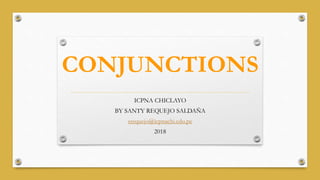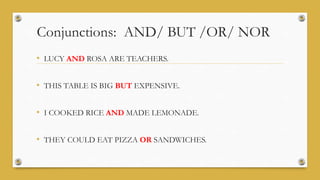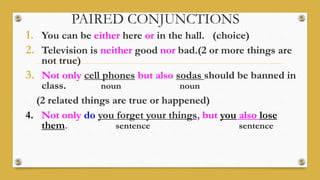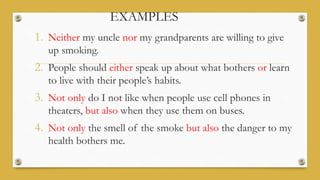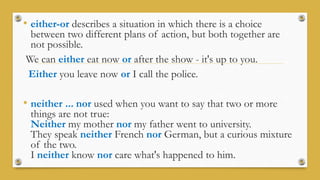Conjunctions
- 1. CONJUNCTIONS ICPNA CHICLAYO BY SANTY REQUEJO SALDAÃA srequejo@icpnachi.edu.pe 2018
- 2. Conjunctions: AND/ BUT /OR/ NOR âĒ LUCY AND ROSA ARE TEACHERS. âĒ THIS TABLE IS BIG BUT EXPENSIVE. âĒ I COOKED RICE AND MADE LEMONADE. âĒ THEY COULD EAT PIZZA OR SANDWICHES.
- 3. PAIRED CONJUNCTIONS 1. You can be either here or in the hall. (choice) 2. Television is neither good nor bad.(2 or more things are not true) 3. Not only cell phones but also sodas should be banned in class. noun noun (2 related things are true or happened) 4. Not only do you forget your things, but you also lose them. sentence sentence
- 4. EXAMPLES 1. Neither my uncle nor my grandparents are willing to give up smoking. 2. People should either speak up about what bothers or learn to live with their peopleâs habits. 3. Not only do I not like when people use cell phones in theaters, but also when they use them on buses. 4. Not only the smell of the smoke but also the danger to my health bothers me.
- 5. âĒ either-or describes a situation in which there is a choice between two different plans of action, but both together are not possible. We can either eat now or after the show - it's up to you. Either you leave now or I call the police. âĒ neither ... nor used when you want to say that two or more things are not true: Neither my mother nor my father went to university. They speak neither French nor German, but a curious mixture of the two. I neither know nor care what's happened to him.

